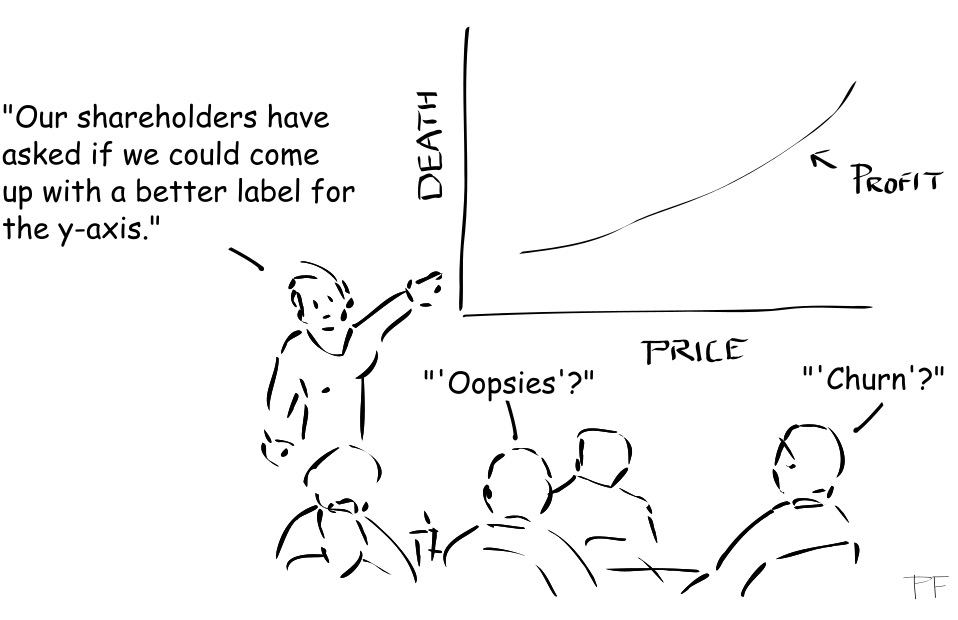Behavioral Economics and Customer Experience – Part 2 – Price Gouging and Revenge
Price gouging – a particularly insidious move
The New York Attorney General has launched an investigation into Mylan Pharmaceuticals, the maker of EpiPens. An EpiPen is used to provide life-saving injections to people in anaphylactic shock, due to allergies. The reason for the investigation is that Mylan have had a monopoly on the product and have increased its price in the USA by 471% since acquiring it in 2007. The CEO’s initial public attitude to this seems to be something like “Hey… I am just running a business here.”
Daniel Kahneman has written about price fairness and the consequences of unfair pricing in Thinking, Fast and Slow. He gives examples of a hardware store that puts up the prices of snow shovels by a third during a storm, and of an employer putting down the salary of an existing employee due to competition. Very few people consider these practices to be fair. So what? So… he goes on to cover the revenge customers are prepared to take when they see an unfair practice. Indeed, not only will customers take revenge, many other people who are not customers will happily join in to punish the unfair practice and they will all feel great about it. This is what is currently happening with Mylan. Go to their website at www.mylan.com. It purports to show how caring they are. The actions do not seem to match the words.
More about revenge
Dan Ariely had an appalling experience with Audi customer service when his car frighteningly stopped working in the fast lane on the Massachusetts Turnpike. They showed no empathy and treated him extremely badly. He decided to take revenge, among other things, by including the story in his excellent book The Upside of Irrationality. The question here is whether your customers will take revenge on you if you treat them poorly. The answer seems to be that they will, and it does not take much.
The Ariely Starbucks experiment
Ariely was self-aware enough to become interested in the nature of revenge and his desire for it. He used a Starbucks and an actor to perform his experiment on unwitting subjects. The actor looked for people who were alone and about to sit down with their coffee. He asked them whether they would agree to do a five-minute task in return for five dollars. He explained the task and gave them a sheet to sign, acknowledging that they had received the five dollars for the task. There was a small stack of dollar bills on the sheet which he asked them to count before signing the receipt. He left them alone while they finished the task, counted the money and signed the receipt, and went off to search for another coffee drinker. However, there were actually six, seven, eight or nine dollar bills in the stack. It was up to the coffee drinker to decide whether to keep the extra cash or return it. This was the control group for the experiment.
The phone interruption
While explaining the task to the other half of coffee drinkers, the actor pretended to receive a twelve-second call from a friend who wanted to have pizza with him that evening. He did not acknowledge the call in any way to the coffee drinker, and just continued with the explanation after hanging up. This was the experimental group. The question was whether they would take revenge for the interruption by keeping more of the excess dollar bills on the table. And the answer is yes, they did. Rather disappointingly, only 45 percent of the people in the control group returned the extra dollars. The amount they received extra had no impact on this. However, when the actor had the fake interruption, it had a huge impact, and the honesty level dropped to 14 percent. Revenge for the annoying interruption.
The power of apologizing
Some time later, Ariely decided to investigate whether apologizing made any difference. He repeated the experiment, and added a third group. To the third group, the actor said, “I’m sorry. I should not have taken that call.” just after hanging up. That one small step completely eliminated the revenge effect, giving results that were the same as for the control group.
Conclusion
You will sometimes screw up. You will sometimes upset your customers. Your products will sometimes not work. (Even a Rolls-Royce person is supposed to have said, “Our cars do not break down. They fail to proceed.”) In such circumstances, the most powerful words you can utter are, “I am sorry.”
As always, your comments are welcome below. Please sign up for our newsletter to ensure you know about new posts. The drawing at the top is by Peter FitzGerald. Thanks for reading.



